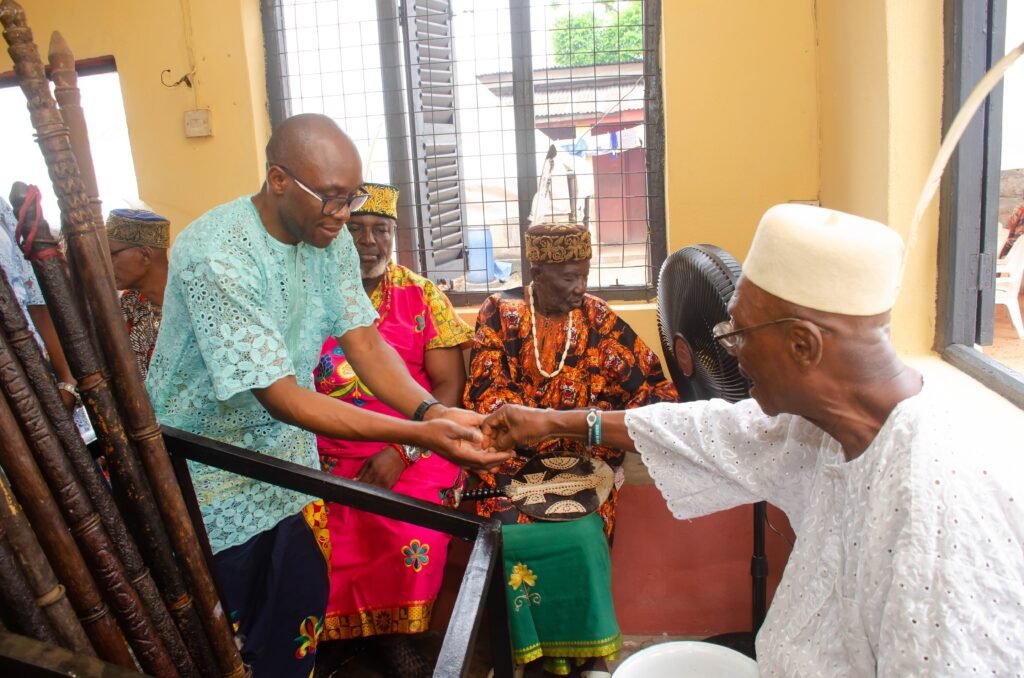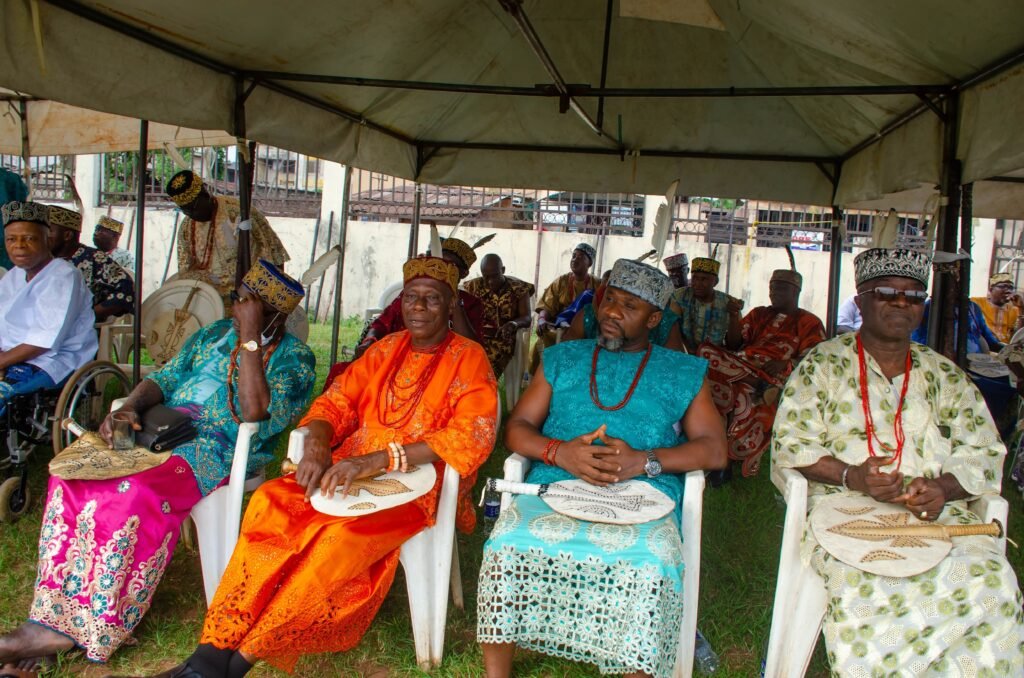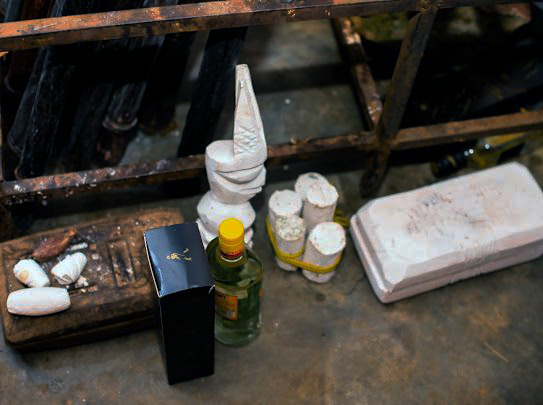the Path
"Je Nyedo Muo"
ODYSSEY
The initiation into the Agbalanze society is a rich tapestry of rites that signify a deep connection to Onitsha’s cultural and spiritual heritage. Becoming an Ozo titled man is a journey marked by meticulous ceremonies that strengthen the individual’s bond with the esteemed Agbalanze Onitsha Cultural Association.
Ozo attainment is a spiritual process rooted in MUO and specific ceremonial items associated with the initiate’s ancestral lineage. The DIOKPA, a key figure, oversees the orchestration and completion of the spiritual rites necessary for Ozo initiation.
Membership in the Agbalanze Onitsha Cultural Association requires the endorsement of the initiate’s kindred group. This progression is reliant upon the fulfilment of all necessary prerequisites and the successful completion of the essential rites that validate the initiate’s status.
Muo
Muo, a spiritual force, represents our ancestors as guardian and protector, binding families, kindreds, and communities. Reverence of ancestors is a cornerstone of Onitsha culture, particularly evident in rites associated with the journey of the Nze na Ozo title attainment.
The people of Onitsha believe that a dead man’s spirit goes to Obodo Muo (spirit land) to have a rest, but before it reaches it’s destination, where God reign supreme, it wonders around the earth unseen for some time until it is purified and stripped of all the iniquities of the corruptible world from where it came.
This period of wondering is called “Ita Okazi” (eating of raw okazi leaves). In order to enable the spirit to reach it’s destination in a short time the “second burial” ceremonies of the deceased are performed during which his connection with the mundane world are finally severed.
In addition to the spirit of the dead in Obodo Muo, it is believed that there are other spirits created by God who run errands for Him to to various parts of the universe, especially to the earth where they perform certain acts of visitation on abominable sinners or bestows blessings of variegated nature on men of goodwill.
Diokpa
The Diokpa also known as the “Ikpala Isi” is the spiritual father of the people in every clan or tribe. Every Ikpala Isi is elected by God. He is a demi-king of the people .
By Onitsha traditions, it must be by inheritance. The seat is not political and those who aspire to forcefully acquire the seat through the influence of their wealth or power are surely incercerating their souls.
Ikpala Isi is the most senior person by Onitsha tradition. He is greater than the Red Cap Chiefs, Ndichie Ume, spiritually. He controls a body of divine ascriptive rite and has control over paternal estate . Most of his time is devoted to his people, fasting and mourning for lost members of the patrilineage and the likes.
Nobody can officiate on the family shrine, except an ozo-titled man.
Even the Diokpa of a family cannot officiate on the family shrine unless he has taken the Ozo title or the lesser part of it known as “Ikpa Muo”, otherwise he has to appoint any Ozo man in his family to officiate on his behalf at his pleasure.
This rather complicated issue only goes to to show the importance of the Ozo title as an order of priesthood. However, by not taking the Ozo title does not lose his unique position as the supreme head of the family, but such supremacy does not allow him an edge over a person ordained to minister to spiritual needs. When an Ozo man presides at the family shrine as an agent of a non- titled Okpala he does so with great caution for he should not by any stretch of imagination treat his principal as a subordinate. He is therefore accountable to him for all his services.
The Okpala generally has the right of presiding over all temporal meetings of his family or clan, with regard to landed properties, estate of a deceased person, matrimonial matters, settlement of disputes, private or individual affairs etc. He is therefore the mouth-piece of his family or clan in legal affairs or matters of inter-group relations.
Ikpala Isi should be a scrupulous person and he is expected to serve as a repository for truth. The image of Ikpala Isi is that of an impoverished man, contented and self-effacing. While he has little or no time to seek his own goals, Ikpala Isi is always concerned instead with his clans adherence to the traditional morality and truth.
However, failing to perform creditably, will attract a heavy curse to himself and his nuclear family.
His duties are as follows:
- He performs the viaticum – Igbu Ewu Izu for a dying Ozo priest of his clan
- He performs the ceremony of Ika Ozu in the absence of Onye Ichie Ume
- He ministers to all spiritual ceremonies including Ani shrine, Nze and holy deities like Ogugu, Urai etc, as the father of the people
- He appoints a capable Onye Isi Ofo – Matriarch for her daughters.
Kindred Groups
- Daike Anayo
- Isiokwe Group 1
- Isiokwe Group 2 (Anwula)
- Iyiawu
- Mgbelekeke
- Obikporo
- Odoje Ndugbe
- Odoje Ubene
- Odoje Odimegwugbuagu Group 1 (Iwegbu)
- Odoje Odimegwugbuagu Group 2 (Olieh)
- Odoje Odimegwugbuagu Group 3 (Izuorah)
- Ogbeabu 1 (Inosi Onira)
- Ogbeabu (Umuchimukwu)
- Ogbembubu (Obi Chimezie)
- Ogbembubu (Onije Okakwu)
- Ogbendida Umuorezeobi
- Ogbeodogwu (Ojidoko)
- Ogbeodogwu (Okakwu)
- Ogbeodowu (Tasia)
- Ogbeotu
- Ogbeozoma
- Ogboli Eke Group 1 (Ozoma Oyive)
- Ogboli Eke Group 2 (Inwagwe)
- Ogboli Eke Group 1 (Umunwanne)
- Ogboli Olosi
- Oreze
- Ubulu
- Umuase
- Umu Onogbo
- Umudei Group 1
- Umudei Orezabo Ibisi
- Umudei Osololi
- Umuezearoli United
- Umuikem
- Umu Obi Udogwu




